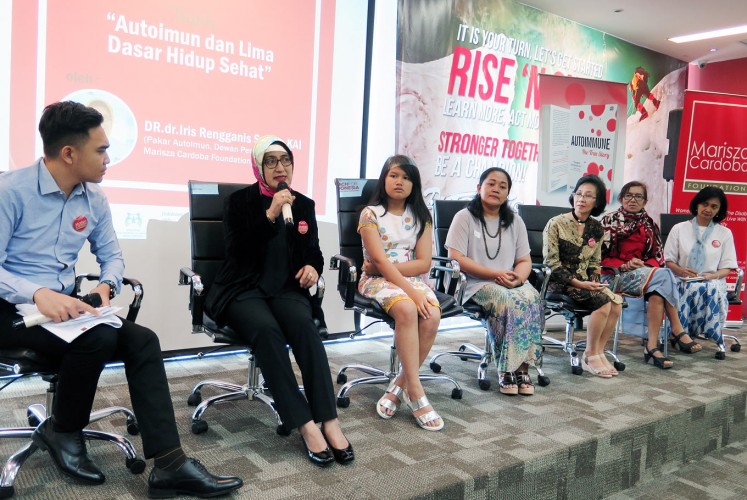Popular Reads
Top Results
Can't find what you're looking for?
View all search resultsPopular Reads
Top Results
Can't find what you're looking for?
View all search resultsFighting against autoimmunity
Help comes in many forms. For some autoimmune survivors, it is found in a WhatsApp group.
Change text size
Gift Premium Articles
to Anyone
Novi Ferdiansyah was confused after finding bruises on the body of her 11-year-old daughter, Anisa Fikanolanda.
To discover their cause, the 34-year-old mother from Lampung brought her daughter to a hospital, but failed to get a satisfying answer from a doctor, who later advised her to go to a better hospital in Jakarta instead.
In the capital city, they met with two doctors, but their diagnoses contradicted each other, making Novi even more confused. Back at home, her daughter’s confusion worsened as Anisa began facing new health issues.
“When she [Anisa] had her first period, I felt there was something unnatural because her period lasted for almost a month. She even had to get blood transfusions for two months afterward,” Novi recalled.
She did not stop looking for information about her daughter’s illness until she found the Marisza Cardoba Foundation (MCF), from which she learned that Anisa was living with autoimmunity.
Novi shared her story while attending the launch of a book titled Autoimmune: The True Story, during which she spoke with other autoimmunity survivors, including doctor Iris Rengganis, a member of the board of supervisors of MCF and the head of Indonesia Immunology and Allergy Association (PERALMUNI).
Read also: Small improvements to eating habits may prolong life: study
Published by Gramedia Pustaka Utama, the book is the work of MCF, a foundation that autoimmunity survivor Yuta Marissa Kardoba and doctor Andhika Rachman set up in 2012 to build people’s awareness about autoimmunity as well as to help its survivors live better lives.
Iris said that autoimmunity was a condition, that occurred when the immune system, which normally acts as protector of the human body from viruses or bacteria, commits an error and instead launches an attack on joints, muscles, skin, red blood cells and other healthy tissues and organs.
The condition is as vicious as a deadly cancer but they are two different diseases because cancer occurs due to the attack of mutant cells.
Each autoimmunity survivor can have more than one medical specialist because the disease attacks many organs and contributes to many different conditions.
“It is a disease with 1,000 faces,” said Iris, who was diagnosed with autoimmunity in 2013.
Health talks: News anchor Jason Sambouw, (left to right) autoimmunity survivors Iris Rengganis, Anisa Fikanolanda and her mother Novi Ferdiansyah, Yonita Chandra, Yennel Suzia and Lilik Sudarwati talk about autoimmunity in Jakarta. (JP/A. Kurniawan Ulung)Autoimmunity is not new to Indonesia, but it has recently attracted attention, especially after MCF raised awareness of it, according to Iris, who works at Cipto Mangunkusumo General Hospital (RSCM) in Jakarta.
The foundation has helped some 1,600 autoimmunity survivors across the archipelago through its WhatsApp Group, in which survivors can consult with at least 40 doctors and experts on autoimmunity.
Read also: Immunotherapy offers hope to lung cancer patients
The 650-page book contains 36 topics, such as Being at Peace with Autoimmunity by doctor Novi Arifiani, Smiling Anytime by doctor Florentina Wahjuni and Smart Ways for Healthy Living by doctor Lavinia Suryadi.
What makes the book interesting is that each topic includes WhatsApp chats between patients and their doctors about the issue, from which readers can draw lessons.
The causes of autoimmunity remain unknown, but doctors believe it is related to genetic factors (25 percent) and environmental and lifestyle factors (75 percent), including food intake, sleep patterns, stress levels, pollution, infection and radiation.
It is often described as a woman’s disease because 80 percent of its victims are women and children.
“It is related to hormones, such as the high levels of estrogen that women have. Men are lucky,” Iris said.
American Autoimmune Related Diseases Association (AARDA) reports that autoimmunity has 157 types, including lupus, which affects kidneys, the brain, skin, joints and other organs.
Many of these types have similar symptoms, which makes diagnosis difficult. But, the common symptoms are extreme fatigue, being easily forgetful, needing more time than usual to do simple activities, fever with joint pain and suffering from health problems that do not heal.
In Indonesia, autoimmunity reportedly affects 40 million people and according to Iris, one of the most common autoimmunity types in the country is lupus.
Due to a lack of information, most autoimmune survivors do not realize they live with it. After being diagnosed with the condition, they usually feel their lives have been ruined.
Autoimmunity cannot yet be cured, as no antidote has been discovered. However, survivors need not give up because they can control the disease to attain a better quality of life.
They can weaken their malfunctioning immune system in a bid to reduce its aggressiveness in attacking their healthy organs.
Read also: Losing someone you love may harm your heart
Iris said that autoimmunity survivors must be vigilant about their lifestyles choices and the places they live or visit because environmental and lifestyle factors contribute 75 percent to the condition.
There are some foods that autoimmune survivors must avoid, such as red meat and preserved foods. “Don’t eat steak. For us, that is poison. Please, replace it with fish.”
They also have to do regular exercise and stay physically active.
“You have to exercise every day for at least 30 minutes. Just do simple sports, such as walking quickly or going up and down stairs like I do at the hospital,” Iris said.
She said that if autoimmunity survivors ignored healthy lifestyles, they would not live better lives even if they consumed the best and most expensive drugs in the world.
“The last thing to remember is to think positively. Don’t be sad and cry. If we are sad, it will have negative impacts on our immune system. We have to always smile,” she said, underlining the power of stress management.












